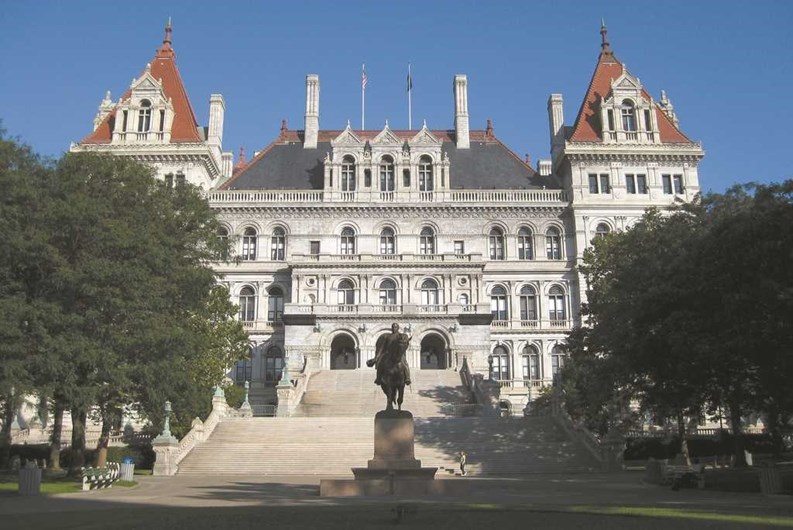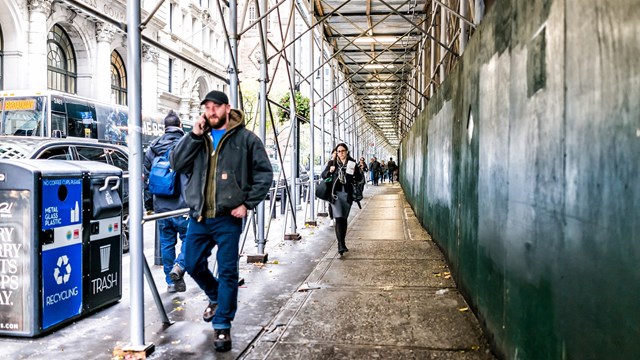In today’s legislative world, housing is a big item. Rent-payers, condo owners, co-op shareholders, and developers all have their particular interests—and they don’t necessarily mesh. In the meantime, the ongoing recession threatens all of them.
Bill after bill has been introduced, some of them new, others re-introduced after seeing no action in the past. And even if there are no blockbuster new issues, there is plenty of unfinished work from previous legislative sessions.
Much of the main action takes place in Albany. A search of the New York State Assembly’s website at the time this article was written (http://assembly.state.ny.us/leg/) shows that 42 bills come up when the word “condominium” is searched for and eight bills come up for “co-op.” (See sidebar).
Reflecting Constituents
Many of the bills, as you can see, are sponsored by Assemblyman Jeffrey Dinowitz (D-Kingsbridge/Riverdale). Dinowitz isn’t on the Housing Committee, but his district, particularly Riverdale, contains many co-ops. The majority of his bills, he says, are held over from last year.
“Generally speaking,” he says, “other forms of housing, particularly rental housing, are getting the spotlight, one, because it has tremendous needs, and second, because there are a tremendous number of people in rental housing.”
The most important issue for co-ops and condos, he believes, is that for tax purposes, they are thrown in with rental apartments as “Class 2” rather than “Class 1” (one-, two- and three-family houses). This is important because Class 1 properties are capped at 6 percent yearly increases.
This issue came to the forefront when several northeast Queens co-ops earlier this year received and strongly protested assessed valuations (which taxes are based on) in the double or triple digits (see April 2011 Cooperator). Assemblyman Edward Braunstein’s bill attempts to end this disparity by limiting the amount of increases in assessments to 6 percent for co-ops and condos as well. Braunstein represents the affected area in Queens.
Not all of the legislative action related to co-ops and condos takes place in Albany—some takes place in the City Council. A search of the City Council’s website reveals 167 bills related to housing (many of them dealing with only one development or buildings) but few related to co-ops or condos. (By the way, here’s one odd fact—a search of the word “co-op” revealed a bill against force-feeding fowl to enlarge their liver).
Robin Levine, a spokesperson for the City Council, points out that there are two bills now that relate directly to co-ops and condos: Intros. No. 326 and 188. Intro 326, introduced by Councilman Brad Lander (D-Park Slope/Kensington) is basically a version of the “written rejection” bill—namely, it would “give rejected parties the right to at least as much information as they would get if they were turned down for a department store credit card. Co-ops would still be able to reject people for legal reasons.”
Many people in the co-op and condo community have opposed the idea, believing it would take away boards’ autonomy and discourage owners from serving on boards.
The other bill Levine mentions, Intro 188, would require cooperative housing corporations to provide a decision to an applicant’s completed application within 45 days. This bill is less controversial within the co-op community. Note that this bill has a counterpart in Albany, A3053.
Action and Advocacy
Mary Ann Rothman, executive director of the Council of New York Cooperatives & Condominiums (CNYC), mentions how a bill that passed the City Council in 2010 is still impacting the co-op and condo community. Intro 194-A mandated that all No. 2 and No. 4 home heating oil contain at least 2 percent biodiesel. No. 6 heating oil is also being phased out. Now, she says, representatives of the industry have to discuss how this will be implemented.
What housing-related measures are industry groups following?
Michael Slattery, senior vice president for research at the Real Estate Board of New York (REBNY), says that on their particular agenda, one of the most important items is the extension of the city’s J-51 tax abatement program.
“We would like to see the extension of the J-51 program,” he says, “which provides important incentives for renovating existing residential buildings citywide.” Although the J-51 program is basically for rentals, many older co-op buildings also have rent-regulated or rent-stabilized rental apartments.
On the subject of the city’s 421a program, which promotes multi-family residential construction by providing a declining property tax exemption based on the new value created, Slattery says, “We should correct an omission in the extension of 421a and make it clear that this program is available in high-density (FAR 15) zoning districts. This correction would permit the development of 80/20 mixed income housing in market areas in which this program is economically viable.”
In addition, Slattery believes that the union-supported movement to mandate “prevailing wages” on all city-funded jobs would “significantly lower the amount of affordable housing that could be built given the current level of available subsidies.”
On the aforementioned subject of 421a, Michael Martino, CPM, of Martino Real Estate, and the former president of the New York chapter of the Institute of Real Estate Management (IREM), adds that the program has been amended to provide for real estate tax exemptions.
This, he said, “allows additional time—up to three years—for projects underway (certain defined periods) to be eligible for the exemption and set time frames ranging up to 20 years for real property tax exemption for new construction projects that meet the conditions of the statute.”
Another former Greater New York IREM president, Dawn Carpenter, says the group is taking an interest in the aforementioned condo owner’s bill of rights bill (A07716), sponsored by Housing Committee chair Vito Lopez; the Lead Based Paint Notification bill, A6556, which provides notification of prospective lessees about the presence of lead paint; S2882, Action for Willful Neglect, which relates to residential housing and treble damages (a legal term that indicates that a statute permits a court to triple the amount of the damages to be awarded to a plaintiff, generally in order to punish the losing party for willful conduct); and A1466, Prevention/Disclosure of Mold, which requires sellers of “certain real property” to disclose any history of indoor mold. All of these measures were pending at the time this was being written.
Carpenter also says it is widely believed that a “reasonable/written rejection bill” for co-ops and condos will pass, since it is considered “an ongoing human rights issue.”
Moving Forward
What do industry groups do to advance their agenda, both in Albany and in the City Council?
Often, the organizations use their knowledge of real estate and building to explain things to legislators. A legislator might have a very broad idea of what he wants a bill to accomplish but may be unaware of unexpected costs or problems the bill might cause. At times, after representatives meet with a legislator and explain their concerns, that legislator might modify his bill.
“How do we advocate?” asks Rothman. “We try to keep lawmakers and government officials educated about the needs of co-ops and condos and informed about our existence. If a legislative action comes up and we have an objection, we want them to seek us out and say, for example, `What do you think of the prevailing wage bill’?
“If something comes up that we think is very wonderful, we will write letters, hold hearings, make statements and make our voices heard. If there is a bill we think is not beneficial, first we try to quietly negotiate. If that doesn’t work, we would do all those things to explain the drawbacks.”
Carpenter says, “Each year, IREM members attend lobby day in Albany to discuss legislation that affects the real estate industry and the private property rights of consumers. Lobbyists and PACs are essential to the real estate industry, as they are on the front line fighting to protect and preserve the rights of both real estate professionals and the consumers they serve.”
Slattery adds, “We advocate for legislation action that is fair, reasonable and good for the industry and the city. In advocating for a position, we always present the merits of the proposal and also demonstrate why it is good for the city and the state.”
Local co-op and condo-related groups are also important. Dinowitz meets regularly with the Association of Riverdale Cooperatives and Condominiums. The Brooklyn Co-op and Condo Coalition is also active in that borough, and in northeast Queens, the Presidents Co-op Council, a think tank of co-op and condo board presidents in eastern Queens, was the force behind the movement to protest high valuation increases.
More Money Matters
Although this is not in the legislative arena, another important issue for the co-op and condo community involves the new Fannie Mae/Freddie Mac rules and requirements.
Fannie Mae, founded by the government in the late 1930s, basically provided banks with federal money to finance home mortgages. In the 1990s the corporation, under federal legislation, began to focus more and more on affordable housing for middle- and low-income homebuyers.
Freddie Mac was created in 1970. It buys mortgages on the secondary market, pools them, and sells them as a mortgage-backed security to investors. This theoretically increases the supply of money available for mortgage lending and for new home purchases.
Among the many new rules that were passed in 2009 for Fannie Mae or Freddie Mac-financed developments are: For new construction and newly converted condominium developments, 70% of the units must be pre-sold (closed or under contract); no more than 20% of a project can consist of non-residential space; no more than 10% of a project can be owned by a single entity; there can be no pending litigation involving structural soundness, safety or habitability; and the condominium/homeowners association must have at least 10% of its budgeted income designated in a capital reserve fund for replacement reserves and adequate funds budgeted for the insurance deductible.
“Fannie Mae is making everything cost more, further blocking the flow of funds,” says Rothman.
“The new lending guidelines regarding the amount of condo reserves have affected sales greatly,” says Carpenter. “Condo boards have been forced to think budgetary needs. Many have increased the common charges to cover the required reserves.”
Has federal stimulus money impacted the local housing market?
“New York City fared better than the rest of the nation in the economic crisis of 2008, 2009, 2010. I don’t think I have any way of knowing what happened if there hadn’t been a stimulus bill,” Rothman says, but money provided to lending institutions has enabled to them to make loans. “They’re not doing these loans as much as we’d hoped but at least a trickle of funding is coming for the purchase or refurbishing of co-op and condo units.”
Raanan Geberer is a freelance writer and a frequent contributor to The Cooperator.







Comments
Leave a Comment